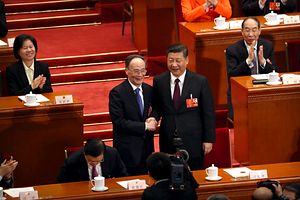Over the weekend, as part of the annual session of the National People’s Congress, China unveiled a series of new appointments to the state’s top leadership. China’s former anti-corruption czar, Wang Qishan was appointed vice president, as predicted. Meanwhile, Yang Xiaodu, Wang’s former subordinate, was appointed as director of the newly established National Supervisory Commission (NSC) — which was not at all expected.
Both men, together with Zhao Leji, Wang’s successor as head of the Central Commission for Discipline Inspection (CCDI), the highest internal-control institution of the Chinese Communist Party (CCP), will have significant roles in the next phase of China’s anti-corruption campaign.
As The Diplomat noted earlier, most analysts had already made their bets on Wang’s appointment as soon as the Hunan Province People’s Congress announced that Wang, together with other 117 members, had been appointed as a deputy to the National People’s Congress (NPC), China’s national legislature on January 29. According to the CCP’s unwritten rules — though some of those rules have been significantly changed by top leaders in recent months — only top state officials have seats in the new NPC, while those retiring or outgoing leaders do not.
When the “Two Sessions” officially kicked off on March 3, there was widespread consensus among analysts that Wang, 69, was set to be the vice president. Wang was seated right next to the CCP’s top seven — the seven members of the Politburo Standing Committee (PSC) that run the country as the CCP’s highest decision-making body. This moment, featured and broadcast by China’s state television station, CCTV, to the whole world sent a political message that couldn’t be clearer.
Thus, no one — either at home or abroad — was surprised by the final announcement of Wang’s appointment. Importantly, after making such a great effort to elevate Wang to the vice presidency, despite his having reached the unofficial retirement age, it’s expected that Chinese President Xi Jinping will grant Wang actual power in the future — more so than traditionally held by the vice president.
By contrast, Yang’s appointment as head of the NSC was a total surprise. Most analysts had expected previously that Zhao, director of the CCDI, would lead the newly established NSC — a controversial and powerful state body that will effectively extend the powers of the CCDI.
According to his resume, Yang, 64, has been working as a deputy director of the CCDI since 2014. This means that he had worked as a direct subordinate to Wang Qishan — head of the CCDI from 2013 to 2017 — and Zhao Leji. It’s also highly likely that Yang will keep his position in the CCDI — a move that can guarantee the CCDI’s effective leadership over the new NSC, and by extension the Party’s absolute leadership over the state. Yang may be chief of the NSC, but he still will have to answer to Zhao at the CCDI, making the hierarchy of the two organizations clear.
In their new posts, Wang, Zhao, and Yang, as a threesome, will undoubtedly push the anti-corruption campaign launched by Xi Jinping to a new high.
In November 2017 when Wang just stepped down from his position as the CCDI head, he published a more than 5,000 word article in China’s state newspaper, the People’s Daily, emphasizing that the top priority for the anti-corruption campaign has been and will be “eradicating interest groups that are intertwined with political corruption and economic corruption.”
Specifically, Wang pointed out in his article that “political corruption is the biggest corruption, where interest groups form in an attempt to steal party and state power” and proclaimed that “the clampdown on corruption can never be relaxed at any moment.”
Notably, at a public forum in March 2017 and later at a national press conference in October, Yang had also made speeches on clamping down on “interest groups.”
As The Diplomat has been following, the Chinese government announced in late February that it has taken over Anbang Insurance Group, the Chinese financial conglomerate that purchased the luxury Waldorf Astoria hotel in New York in 2014. The announcement also confirmed that founder Wu Xiaohui, who had been detained in China for unknown reasons since early June 2017, is officially being prosecuted for financial crimes.
This development means that the anti-corruption campaign has officially reached China’s most lucrative field — the financial and economic sector. The latest formation of the Wang-Zhao-Yang threesome, which has centralized the power of the Party and the state and gained Xi’s absolute support, has further sent an ominous message to that sector.

































